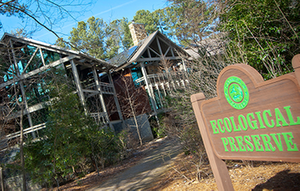
Catawba College has been named to The Princeton Review’s 2021 Top 50 Green Colleges list. The Princeton Review noted Catawba’s “well-rounded education grounded in the liberal arts, a commitment to environmental sustainability, and classes structured around current events.” Also cited were Catawba’s:
- Focal point of preparing students to enter their prospective fields.
- The 189-acre Fred Stanback Jr. Ecological Preserve, which serves as a living classroom for professors and a place for students to enjoy nature.
- Close relationship with downtown Salisbury.
The Princeton Review, headquartered in New York City, is a tutoring, test prep, and college admission services company. Its 11th annual Guide to Green Colleges was published during October, Campus Sustainability Month, the international celebration of sustainability in higher education.
To be selected for the Top 50 List, a college must maintain the following statistics:
- 21 percent of total food purchases are from local sources and/or organic.
- 49 percent of waste is diverted from incinerators or solid-waste landfills.
- 98 percent offer a sustainability-focused undergraduate major or degree.
- 100% have a sustainability officer.
The guide includes information about the school’s admission requirements, cost and financial aid, and student body statistics.
The Princeton Review chose 416 colleges for its broader Guide to Green Colleges list, based on its survey of administrators at 695 colleges in 2019-20 concerning their institutions’ sustainability-related policies, practices, and programs. Survey topics ranged from academic offerings and campus initiatives to career preparation for “green” jobs. The Top 50 ranking is based on data from surveys of administrators, as well as its surveys of students attending the colleges.
The Princeton Review reports a high level of interest among college applicants and their parents in colleges with green practices, programs and offerings. A total of 65 percent of the 12,845 respondents to the survey (students and parents) said that having information about a college’s commitment to the environment would affect their (or their child’s) decision to apply or to attend a school.
